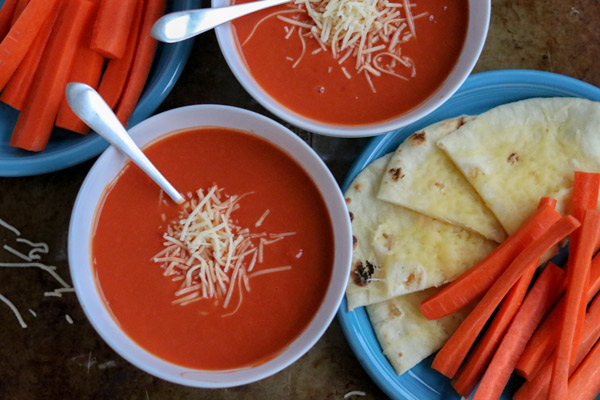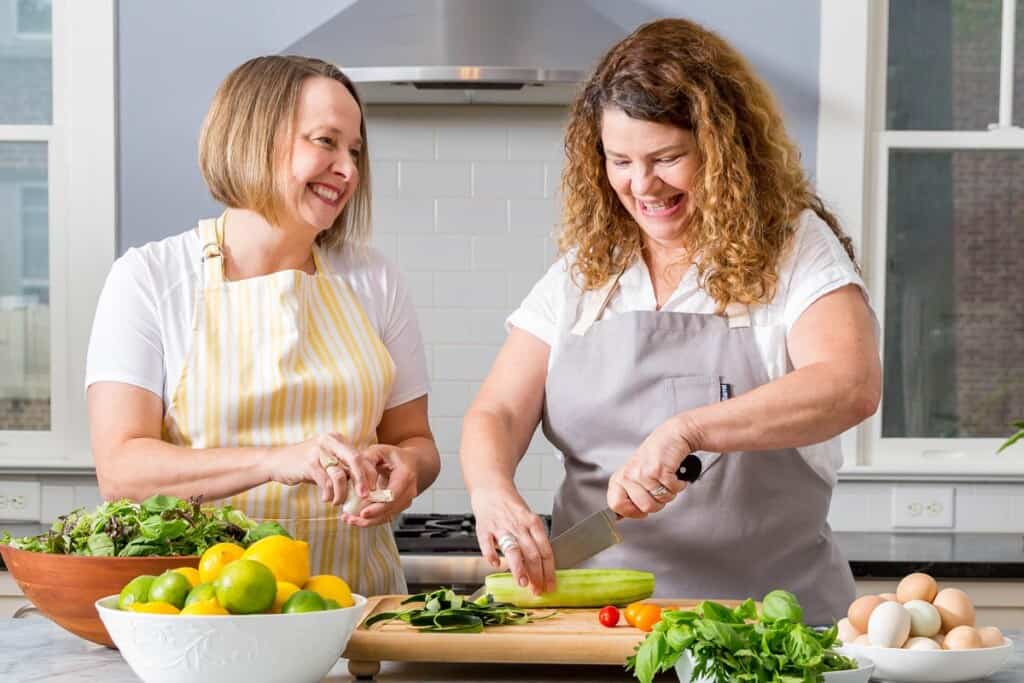The last several weeks have been an unprecedented time for our world. Our “new normal” is being at home with our family members and attempting to do school work, housework, and professional work. Emotions are high. People are scared and worried about finances, getting sick, and how their children are adjusting. In the midst of all of this, we are getting all sorts of advice on how to cope and function, and some of it is bad advice. Our culture’s fear of weight gain and anxiety over food makes us particularly drawn to giving each other food and feeding advice. And, honestly, so much of it is bad advice.
3 pieces of quarantine food and feeding advice to ignore
1. “Lock the cabinets”
I have seen the recommendation several times via social media that we should lock the cabinets/refrigerators so our children and ourselves won’t eat while we’re home more. This is called restriction and it can be detrimental to an individuals’ own relationship with food.
Limiting access to food creates food insecurity. Food insecurity is a risk factor of developing disordered eating. I think most of us can agree that we want our children to grow up to have a healthy relationship with food — to trust themselves, their bodies and their appetites. If they had more structure around food before the quarantine (less access to the kitchen/cabinets because of schedules) they may have a period of time they eat more or even “a lot” because they’ve gone from limited access to increased access. The solution isn’t to restrict them more. Restriction only leads to food thoughts, food insecurity, eating in the absence of hunger, and body distrust.
Love this post and want to save it for later?
Just fill in your email address below, click “Save It” and get it delivered right to your inbox.

Instead:
- As Ellyn Satter says, “Provide, don’t deprive.”
- Focus on providing regular meals and snacks, at set times.
- Have everyone stop their work/play and come to the table to eat.
- Offer filling meals and snacks with all types of foods.
- Offer “fun food,” like sweets and chips, at planned meals/snacks so they aren’t forbidden or restricted.
- If someone is eating between eating times, try “Snack time is in a little while, let’s have those as part of our snack.” Or “Come to the table and sit down, I’ll help get a few more items for snack and sit with you.”
2. “Watch out for the ‘Quarantine 15’”
It is criminal to me that we are in a pandemic, people are dying, and people are making jokes and evoking fear about weight gain. Pandemics are scary. Weight gain is not, but our culture teaches us that it is. Some people may gain weight in quarantine. Others will not. When we constantly are demonizing weight gain and criticizing certain body sizes, we are harming people’s health rather than supporting it. Fear, shame, and weight stigma have all been linked to poor health outcomes.
This is a hard time that has evoked high emotion in people. Emotional eating is one way humans cope with their emotions. Emotional eating is not inherently a bad thing. We may feel better when we eat a warm meal that we remember from our childhood. Isn’t it cool our brain and body can reach for that and feel better?

Instead of fearing weight gain:
- Accept that emotional eating is one tool in your toolbox.
- Think about other tools you have to cope with your emotions. Going outside? Talking to a friend? Engaging in joyful movement? Using a weighted blanket? Swinging in a swing? Knitting? Playing a game? Reading a good book?
- Nourish your body with regular meals and snacks.
- Trust your body by eating the foods your body craves.
- Tell yourself you and your body you are doing the best you can.
3. “Make daily snack boxes“
This advice recommends that since everyone is home, one feeding strategy is to make each child a daily “snack box” and tell them they can eat it whenever they want but when the food is gone, it’s gone. While every family is different, overall I think this advice also involves restriction. How do you know how much to put in the box? What are you putting in the box? What age child might this be appropriate for? What if your child needs more food than what is in the box? Doesn’t this just feed into a child asking for food/whining when the box is empty?
Children do well with structure. Just as we give our children bedtimes or nap schedules, having a food schedule supports them in being competent eaters. It helps them listen to their bodies and trust themselves to eat as much or as little as they need.
Also, if you’re only putting packaged food in this box, you’re elevating these foods above the others. When we limit certain foods, we and our children only want them more. If there is a food your child is very focused on, then start to offer that food (without them asking) fairly regularly. The food will lose its scarcity appeal. It may still be super yummy to them, but it won’t be forbidden or scarce.
Instead:
- Offer all types of foods at meals and snacks.
- Have your kids take a break from what they are doing and come to the table for a snack.
- You decide the “when,” “what” and “where,” per Satter’s Division of Responsibility in Feeding.
- Let your child decide “if” they are going to eat and “how much.”
- Invite kids into the kitchen to help. Allow them to be a part of the food planning and preparation. Check out this post from Elizabeth for ideas.

While we continue to walk through this time, remember YOUR wisdom is invaluable. You know what is best for you and your family. Trust your own quarantine advice, even if it’s quite different from your neighbor’s. Structure with food and meals can be grounding and anchoring for the day. It can be an expected and familiar touch stone as we navigate so much newness. Bodies are wise, and it’s okay to trust them, especially right now.
More blog posts and recipes

We’re Elizabeth & Anna!
It’s great to have you here. We’re registered dietitians and we share tips to support you in raising kids with a healthy relationship with food.





